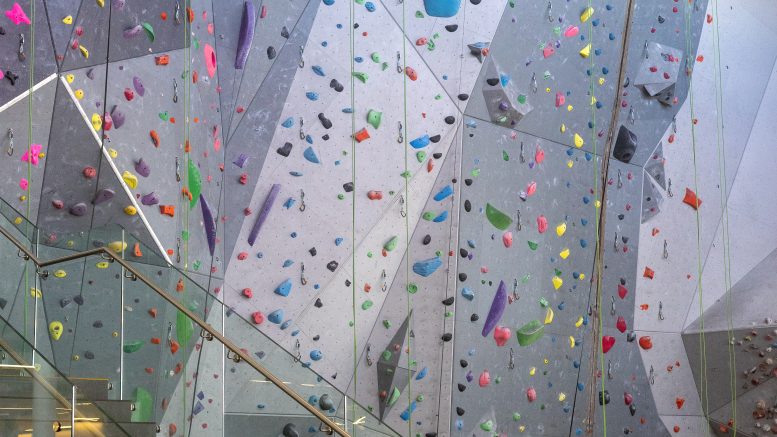Sports, the people who play them, and the community fostered around them, have always fascinated me. As a queer person, getting involved in sports organizations both in and out of the closet can be an experience fraught with tension — a tension that has been mounting exponentially in recent years.
Following policies introduced in Alberta that aim to ban transgender women from participating in women’s sports leagues, I set out to learn more about how sports organizations on campus are creating explicitly inclusive and queer-friendly spaces. U of Them is creating just that kind of space. The group has a dedicated bouldering night where women, nonbinary and gender non-conforming people get together to climb at the University of Manitoba. It has been running for roughly one year and is not affiliated with the U of M climbing club.
I joined six people, including Kirstyn Eckhardt, one of the Active Living Centre’s rotating climbing gym instructors, who went to check it out recently. Of the five other participants, Mary Lillington and Leia Hermesdorf were regulars, Hanako Teranishi was a returning climber while two alumni, Chelsea and James Mckee-Trenchard, joined for the first time.
Eckhardt said that U of Them is a “quieter space” and “a safer space for [people] to climb and feel welcome.” She noted that people “typically come in pairs,” but some show up on their own as well.
The group is open to climbers of all experience levels and is “good at welcoming people,” she added. “People have improved in their climbing and are making friends here.”
The climbers expressed varying levels of intimidation and discomfort when climbing in mixed spaces. Reasons for this discomfort ranged from a lack of women in the climbing spaces to perceived judgement towards form and approach. “I knew it was going to be a safer spot,” Teranishi told me, “because it would be [a] queer and woman-designated space.”
Hermesdorf said the relaxed and supportive atmosphere was one of U of Them’s draws.
Chelsea pointed out that we were talking about the need for queer-friendly spaces mere days after the death of Nex Benedict, a trans, nonbinary teenager from Oklahoma, U.S. who was beaten by schoolmates in a women’s bathroom and died the next day.
Teranishi reiterated how concerning it has been to see anti-trans rhetoric in the province, as in last year’s protests against
2SLGBTQIA+ inclusive programming in schools.
Eckhardt said that a pride flag sticker had been removed from the climbing room’s door facing the hallway, which was a “very upsetting” experience.
Among the benefits of climbing, Hermesdorf and Teranishi emphasized the role of the activity in building muscle and combating gender dysphoria. Lillington, Hermesdorf and Teranishi reiterated the mental health benefits of staying active as well. After our interviews, the climbers invited me to join them. They cheered me on as I scaled an easy route and dropped to the floor when I was done, as recommended to newcomers.
Participating in a U of Them climbing session made me eager to go back and climb in a space I knew I was welcome in. At the end of the session, we joked about the substantial overlap between climbers and queer people. Even the climbing holds were rainbow coloured.
It feels like now, more than ever, fun and inclusive spaces are needed on campus, where people can simply exist and try something new.
“People just want to be together and be with community,” Teranishi said.
U of Them meets every Monday between 6:30 and 9:30 p.m. at the Frank Kennedy Center Bouldering Room at the Active Living Centre on the Fort Garry Campus. Equipment is available to rent. To access the facilities, visitors can pay per session, get a membership or buy a 10-visit pass.



